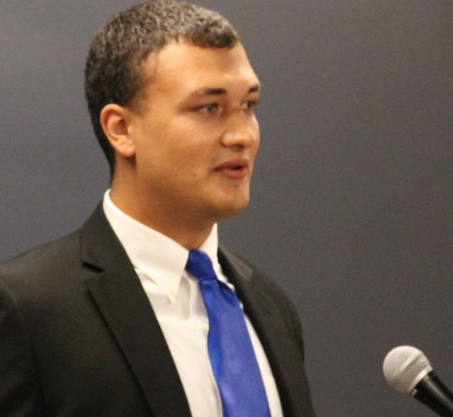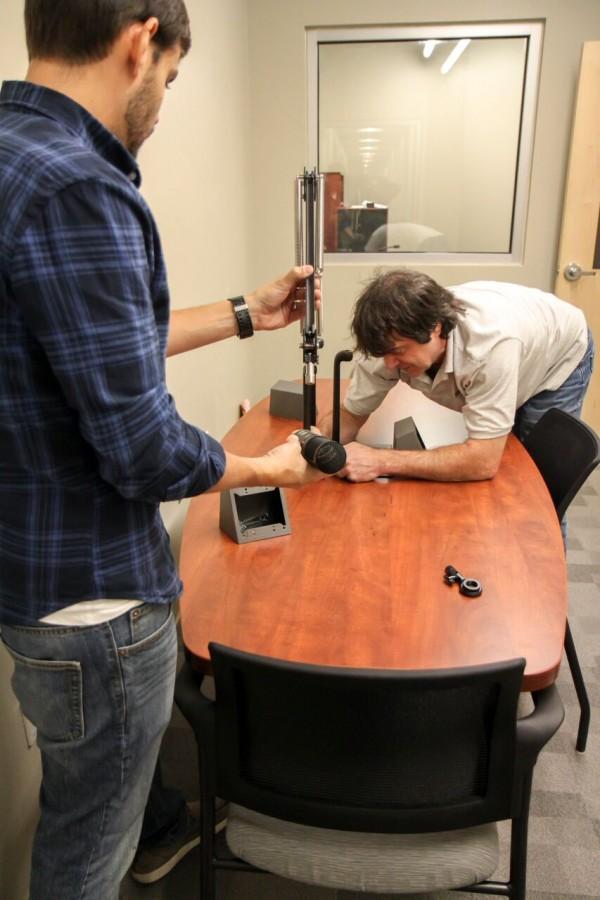How Starting a Club is the Hardest Part
Work being done on the new WAIC studio last month. The station is complete and the impending radio club is waiting for the “okay.”
January 22, 2016
Clubs and organizations are a huge part of the college experience. When there is a great student interest in certain activities, a club can be formed. But creating a club and getting it off the ground is a lot more complicated than getting a bunch of students together in a room. There are many roadblocks and barriers put in place by the school that one must pass.
With the opening of a new radio studio on the campus of American International College, an interest was growing in the possibility of a radio club on campus. Students were ready to use the new space and tools provided. The club began forming, but to become an official organization on campus, many steps had to be taken.
The rules set by Collin McQuade, the Coordinator of Student Activities, state that to become an official club you need at least ten members, a faculty advisor, and a constitution that must be approved by student government.
“We want to make sure we can help make these clubs be the best they can be,” McQuade says.
The faculty advisor for the new radio club is Marty Langford. A Film Studies professor at AIC, Marty has been vocal about his excitement for a radio station on campus. As he stated in an article from last month’s Yellow Jacket: “This is just great news. This will give our students an avenue to express themselves and learn about the industry. They can save their content and use it to seek out professional roles in broadcasting as a career.”
When looking for members to join the club and reach that ten member requirement, issues arose in the recruitment process.
“You can’t have meetings and cannot advertise on campus until you become an official club,” says Zachary Beaver, the head of the Center for Student Engagement. Beaver made this perfectly clear after removing some of the early promotional material regarding a meeting of those interested in becoming apart of the radio club. The school wants to be sure that everything on campus is a good representation of the school. This brings up the conundrum of how to get people to join a club of you can’t let them know that there is a club forming.
Despite getting heat from school officials, the club still had posters plastered all over campus encouraging students to get involved, and later that week a meeting was held regarding the start of the new radio club.
Or as the new club’s motto put it: “it isn’t Rock n Roll if you’re not breaking some rules.”
Held inside the newly built studio, there was a solid turn out with over 20 students signing on to become apart of the new radio club. Students began voicing their ideas for content and how to present the most entertaining product possible. The organization was beginning to take shape, yet to become official, a constitution was still needed.
Alex Clark has an idea as to how important clubs and organizations are to the campus. As the Student Body President, Clark oversees all clubs and organizations, and knows how to get a club off the ground. The President was at the first meeting and is a strong supporter of the club. He gave a blueprint for what exactly needs to be in a constitution.

“A constitution is a guideline for your club. It says what your mission is and what your club is all about,” explained Clark. “What does each member of the club do? Is there a president? What’s their job? How do they become president? These are the things you have to think about when writing your constitution.”
Once the constitution is written it must be approved first by McQuade, then by the Student Government. McQuade will review it make sure structurally it looks good, and will give pointers on how to make sure its thorough.
“You want to make sure you have a system of checks and balances so just incase something goes wrong you have something to refer to,” McQuade said.
The constitution is not set in stone, as once the club is officially formed, members can revise it to fit their needs. Once McQuade approves the constitution it then is sent to the Student Government, where they decide if the new club is something that could be beneficial to the school and the students. They ask questions such as:
- What is it that the club does?
- Why is it something that needs to be on campus?
- How can this not only benefit a certain niche of students, but also the entire student body?
SGA will ask these questions directly to the leading members of the club during a meeting that usually takes place on Wednesday nights. Once the members of SGA have a good feel for what the club stands for, they have a vote to determine its fate. Clubs need SGA backing so they can become not only official but to get the funding from the school needed to keep the organization afloat. Once the constitution is approved, then the club is officially recognized by the school. It can advertise on campus and hold events and fundraisers.
WAIC, the aforementioned radio club, is in the process of having its constitution reviewed by SGA and will be able to vote on its existence in the first meeting of the New Year. If approved, WAIC will be the first radio club on campus in over a decade. Its mission is to provide students with the tools to create a new platform in which they can express their college experience with their peers.
The station will broadcast online, as it doesn’t have the FCC licensing to be on the airwaves. The stream will be played throughout campus in the Dining Commons and the Stinger. It will have students’ first hand take on music, news, politics, sports, and pop culture, as well as give students a new awareness of what’s going on at AIC, the country, and the world around them. Assuming the constitution is approved, WAIC is set to launch in the spring of 2016. Leon Nguyen
Leon Nguyen
The process of getting a club up and running is a long one, but it is in place to ensure that the club and the students of AIC can get the best possible. While the rules and regulations set up may seem to hinder students who are trying to start a club AIC, the man who enforces those rules, Zachary Beaver, is always supportive of the students.
“We love it when students take initiative to start a club, we just want to make sure it’s something that represents AIC in a positive light,” Beaver says.



